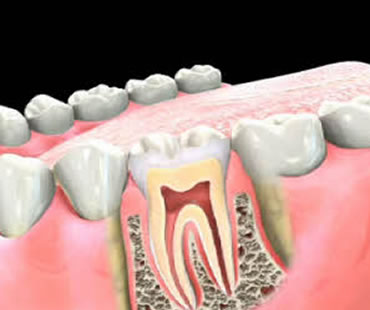
by Dr. Adkins | Apr 30, 2021 | Blog, Dental Topics 2, Root Canal Treatment
A toothache can make everything seem terrible. Your mouth hurts, your head aches, you can’t eat what you want, you can’t sleep comfortably – in general, you feel awful! Your tooth pain may be a result of decay that has caused an infection in your tooth pulp, calling for root canal therapy.
What does that mean exactly? When the inside of your tooth or the pulp becomes infected, it causes the tooth to deteriorate and cause pain and sensitivity. Action is needed to eliminate the infection and protect the tooth from worse damage. Root canal treatment is the best solution because the damaged pulp is removed and the inside of the tooth is thoroughly cleaned and restored.
To accomplish a root canal procedure, your dentist will drill a small hole in your tooth to access the pulp and expertly remove it. Once the area is cleaned and disinfected, your tooth will be filled with a special material and sealed for protection. Finally, a dental crown is usually placed on top to complete the root canal procedure. You are left with a fully repaired and protected tooth.
What benefits does root canal treatment provide?
- Pain is eliminated with the repair of your tooth and removal of infection.
- Your ability to chew and bite foods will return to normal.
- You will no longer experience tooth sensitivity to hot or cold items.
- The damaged tooth will be restored so that it looks natural in your smile.
- Your other teeth won’t have excessive wear to make up for the damaged tooth.
With the advances in dentistry making root canal therapy faster and less painful, your procedure may be completed in as little as one trip to the dentist. Once the process is complete, you can expect your fully restored tooth to last as long as the rest of your teeth.
We treat patients from McDonough and the surrounding area

by Dr. Adkins | Apr 16, 2021 | Blog, Dental Topics 1, Root Canal Treatment
The goal of root canal therapy is to relieve pain, not cause it. The pain you experience before a root canal is the result of damage to the tissues in the tooth. Root canal therapy removes that damaged tissue, therefore relieving the discomfort you feel. If you are still experiencing tooth pain after undergoing a root canal procedure, it could be an indication of a problem with the treatment.
While mild discomfort is to be expected during the root canal healing process, if the pain continues or becomes more severe, it is likely an indication of a problem. There are several reasons for tooth pain after root canal treatment:
- The tooth has an extra canal that was not cleaned and filled, meaning there is an extra physical root.
- The tooth has a small, tight accessory canal that is difficult to locate on x-rays or hard to access with the necessary tools.
- The tooth is fractured due to the damage and weakened state caused by the original decay and the access cavity that is created to begin the root canal treatment.
- The root canal has become reinfected.
- The small files used by your dentist to clean out the pulp of the tooth sometimes break, resulting in a failed root canal treatment.
In the days immediately following root canal therapy, it is normal to experience some tenderness of the tooth or surrounding gum. This discomfort should be easily managed with over-the-counter painkillers and should subside in a few days. If the pain does not ease in a few days or becomes more severe, contact your dental professional immediately to access your symptoms and determine if you are having root canal complications.
We treat patients from McDonough and the surrounding area

by Dr. Adkins | Mar 5, 2021 | Blog, Dental Topics 2, Root Canal Treatment
An aching tooth can make your life miserable. Pain, difficulty eating, inability to sleep, headaches and earaches are some of the problems that often accompany a toothache. If you have any of these symptoms and suspect a damaged tooth, a trip to the dentist is in order to see if root canal treatment might be needed.
What is root canal therapy? Although it has gotten a bad reputation over the years, it is the best way to save your tooth once infection has set in. The cause for the problem can vary, including deep tooth decay, a faulty crown, trauma, or repeated dental procedures. Once the inside of the tooth called the pulp becomes damaged, root canal treatment is the ideal solution. If you don’t seek treatment, severe pain and possible tooth loss may be in your future.
During root canal therapy, the damaged tooth pulp is carefully removed so that the interior of the tooth can be thoroughly cleaned and disinfected. Then the tooth is filled and sealed using a special material. Finally, the tooth is fully restored with a crown or filling to offer protection from future damage.
What are the positive outcomes of root canal treatment? First, it gives you back the complete function and natural appearance of your real tooth. You avoid getting a hole in your smile or needing a procedure like a dental implant. Root canal treatment restores your normal sensation and biting force, providing for efficient and painless chewing. This treatment also protects other teeth from receiving excessive wear, since your real tooth remains in place and able to take its fair share of tooth wear. Of course, treatment will also relieve the pain and other symptoms associated with your damaged tooth.
Root canal treatment is usually quite simple when performed by a qualified dental professional. Modern techniques allow the process to be as comfortable as just getting a normal filling. The procedure may be completed in only a couple of appointments and the end result will be a long-lasting, healthy tooth.
We treat patients from McDonough and the surrounding area

by Dr. Adkins | Nov 27, 2020 | Blog, Dental Topics 2, Root Canal Treatment
Even though regular checkups and proper dental hygiene greatly decrease the need for root canal treatment, the fact remains that it is one of the most common procedures performed by dentists today. What are some of the most common reasons you might need this dental solution?
Decay:
The primary cause for root canal procedures is decay that has entered the tooth pulp chamber and progressed to the point of causing infection or abscesses. Pain and tooth sensitivity often accompanies severe decay. Root canal treatment is the best way to avoid tooth extraction and restore oral health.
Trauma:
If a tooth endures strong force such as from a sports injury, car accident or fall, the trauma can damage the tooth so badly that root canal treatment is needed. Even if trauma isn’t completely evident at first, a severed nerve to the tooth can cause it to die over time.
Genetics:
Traits of teeth like their strength are passed along through genes. Some people inherit soft teeth that are more prone to decay, making it difficult to avoid decay even with diligent oral hygiene.
Tooth fracture:
A tooth can be fractured through chewing hard foods or ice, teeth grinding or clenching, or habits like nail biting. Even hairline fractures may allow bacteria to enter the tooth’s pulp and cause infections. Once the bacteria takes hold, root canal treatment may become necessary.
Deep cavity:
Deep cavities within teeth can allow infections to thrive, eventually causing the tooth to become inflamed or die. A deep cavity isn’t necessarily painful, so patients may not even realize they have an infection. Regular dental checkups help catch cavities early, before they are able to become so deep and serious.
Previous dental work:
Extensive or repeated dental work can cause trauma to teeth nerves and associated inflammation, making root canal therapy an important solution.
If you live in the McDonough area contact us today

by Dr. Adkins | Nov 20, 2020 | Blog, Dental Topics 1, Root Canal Treatment
When a tooth is seriously decayed or has become infected, a root canal procedure can be done to repair the tooth and save it. During the procedure, the nerve and pulp are removed, while the remainder of the center of the tooth is thoroughly cleaned and then carefully sealed to prevent infection.
“Root canal” is the term for the natural space within the tooth’s center. The tooth’s nerve is in the root canal, as is the pulp (or pulp chamber), which is the soft area within the root canal. Because the tooth’s nerve isn’t vital to a tooth’s health, removing it doesn’t prevent the normal functioning of the tooth.
Removing the nerve and the pulp is necessary in some cases to address irritation, inflammation and infection stemming from severe decay, damaged or deep fillings, cracked or chipped teeth or facial trauma. When the nerve tissue and pulp become damaged, bacteria begin to form within the pulp chamber. This can lead to a serious infection or abscessed tooth. An abscess can form when the infection spreads past the ends of the tooth roots.
Additionally, severe infections can lead to bone loss around the tip of the root or holes in the tooth that drain the infection into the gums or through the cheek into the skin. It can cause swelling that spreads to the face, head, or neck.
Sometimes, the only signs you need a root canal procedure are more minor. They can include tooth pain when applying pressure or chewing, discoloration (darkening) of the tooth, tenderness and/or swelling of the gum tissue, or a pimple or blemish on the gums that is recurring. Acute sensitivity to cold or hot temperatures that does not abate with time can also be a sign.
Talk to your dentist or endodontist (a dentist whose specialty is the cause, diagnosis, prevention, and treatment of diseases and trauma to the dental pulp or nerve of the tooth) about your concerns. Your dentist will know what to do so you may make the best decisions for your long-term tooth health.
If you live in the McDonough area and you need a root canal, contact our dental office today.

by Dr. Adkins | Jun 26, 2020 | Blog, Dental Topics 2, Root Canal Treatment
A tooth that has been damaged by decay or trauma may need endodontic treatment, also called root canal therapy, in order to save the tooth. Although it may sound like a scary procedure, advances in dentistry have made it a much less painful or upsetting process than it used to be. This treatment is worth it to restore your smile as naturally as possible.
How do you know you might need endodontics? You may experience pain in the tooth, sensitivity to hot or cold foods or beverages, or swelling in the area. Severe cases may have a discharge of pus near the tooth. However, not all cases of a badly damaged tooth result in noticeable symptoms. That’s one reason it’s important to maintain regular checkups with your dentist, who will pick up on problems with a tooth that you may not realize is damaged. Examination and testing such as X-rays can help diagnose a tooth that is in dire need of repair.
When possible, dentists strive to save your real tooth. Sometimes the best way to do that is through root canal therapy, which involves removing the damaged tooth pulp from the interior of the tooth. Using local anesthesia to make you comfortable, the dentist or endodontist uses special tools to enter the root canal, remove the pulp, and clean the area thoroughly. Once the tooth is ready, a crown is usually placed on top of the existing tooth to protect it from future damage and to complete the process. Sometimes antibiotics are prescribed if an infection was present to help ensure that you are in the best of health.
Endodontic treatment is often compared by patients to simply getting a regular tooth filling. The procedure is usually completed in one office visit and it won’t be long before you are back to your normal routine, with a fully restored natural tooth in your smile.
If you live in the McDonough area contact us today








 770-957-5214
770-957-5214  E-Mail Us
E-Mail Us 
